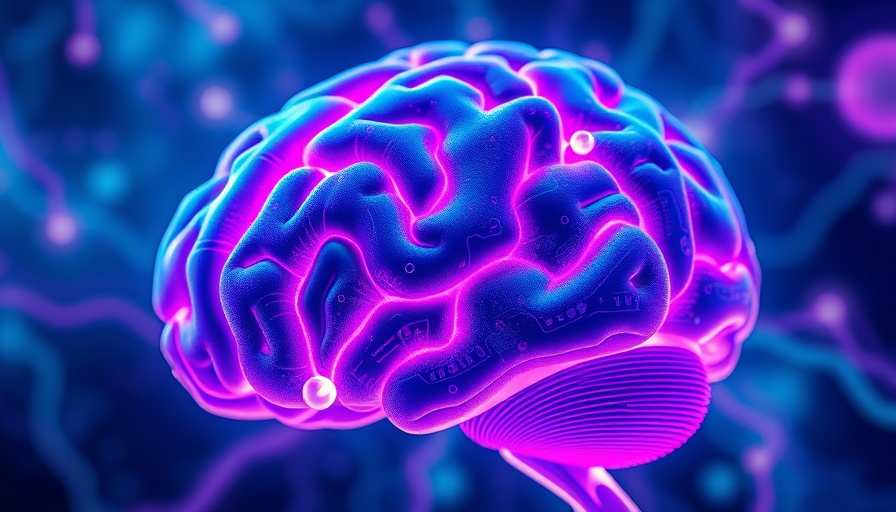
Are Groovy Brains More Efficient? Exploring Neuroanatomy Insights
In a groundbreaking study from the University of California, Berkeley, researchers have uncovered a fascinating link between the brain's surface structure and cognitive abilities. Specifically, the study focuses on the tiny grooves, known as tertiary sulci, that are unique to human brains. These grooves, often overlooked by anatomists, might play a crucial role in enhancing neuroconnectivity, ultimately influencing reasoning and cognitive performance.
The Structure and Function of Sulci
The human brain is characterized by its intricate folds and grooves, which are not merely a product of packing a large organ into the confines of a skull. Recent research indicates that the depths of these tertiary sulci correlate with stronger connectivity in areas of the brain responsible for high-level functions like reasoning. By potentially decreasing the length of neural connections, these grooves enhance communication efficiency among brain regions. This understanding reveals a compelling intersection between structural and functional neuroanatomy.
Implications for Cognitive Performance
Findings from the Berkeley study suggest that variations in sulcal depth may help account for differences in cognitive performance among individuals. Specifically, a deeper understanding of these structures could lead to the development of diagnostic tools or biomarkers for reasoning abilities or neurodevelopmental disorders. As noted by researcher Silvia Bunge, the presence of sulci may facilitate shortened connections between the lateral prefrontal and parietal cortices, regions heavily involved in reasoning.
Neuroscientific Evidence Supports the Hypothesis
Research indicates that in children and adolescents, deeper sulci correlate with increased connectivity between crucial brain areas. This could lead to enhanced neural efficiency and expressive cognitive capabilities. Such insights could also open avenues for innovative educational and therapeutic approaches tailored to an individual's neural architecture.
Comparative Analysis and Future Predictions
As we delve deeper into brain structure-function relationships, the potential applications in educational neuroscience and psychological assessment become clear. With technology advancing rapidly, the future will likely see brain imaging techniques becoming more sophisticated, allowing for more precise mapping of sulcal structures. This could lead to enhanced personalized learning strategies that cater to individual cognitive strengths and weaknesses, making educational settings more adaptive and effective.
Counterarguments: Looking at Structural Misconceptions
While the findings suggest a noteworthy correlation between sulcal depth and cognitive efficiency, it is essential to consider counterarguments. Not all cognitive abilities can be attributed solely to neural structure. Environmental factors, educational backgrounds, and social contexts also play vital roles in shaping cognitive development. Recognizing this complex interplay will be crucial in advancing our understanding of human intelligence.
Insights into Dallas Lifestyle and Brain Health
For readers in the Dallas area, exploring how lifestyle choices impact brain health could be particularly beneficial. Engaging in activities such as regular exercise, socialization, and pursuing new learning opportunities not only boost overall well-being but may also enhance cognitive functions. As the lifestyle management sector grows, the potential for incorporating neuroscience-backed findings into Dallas lifestyle management practices can lead to healthier living and improved cognitive outcomes.
Making Informed Decisions for Brain Health
It’s apparent that understanding one’s brain structure and function could inspire new ways to support cognitive health. Engaging with local lifestyle influencers or health clinics in Dallas, individuals can seek resources or programs designed to promote cognitive fitness. Being proactive about brain health, along with a holistic approach to well-being, could pave the way for a healthier community.
Conclusion and Call to Action
As research into the brain continues to evolve, embracing new findings can empower individuals to take charge of their cognitive health. Whether through lifestyle adaptations or seeking professional guidance, understanding the implications of brain structures offers a wealth of opportunities for enhancing reasoning and other cognitive abilities. The future of brain science is bright, and as we unlock more secrets of the mind, we can better navigate the complexities of human intelligence.
Stay informed, connect with local lifestyle management resources, and explore how you can apply these insights to foster a healthier, smarter community in Dallas!
 Add Element
Add Element  Add Row
Add Row 



 Add Row
Add Row  Add
Add 


Write A Comment